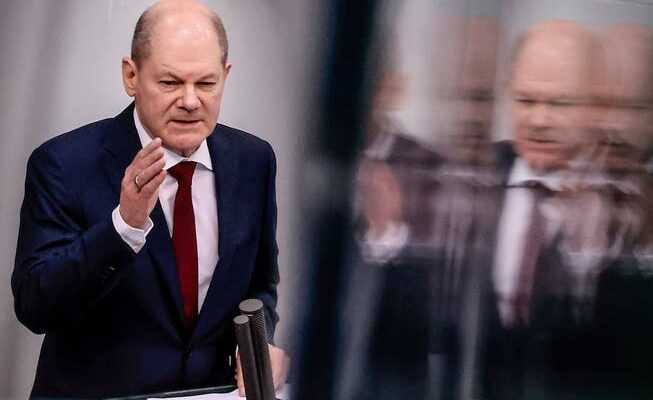Because of Putin’s war against Ukraine, the German government wants to permanently increase the defense budget. The SPD Chancellor Scholz is not only breaking with Angela Merkel’s course, but also with the convictions of his own party.
More determined and clearer than usual: Olaf Scholz in his government statement on Sunday in Berlin.
What Federal Chancellor Olaf Scholz announced to the German Parliament on Sunday can be described as a turning point in security policy. His federal government no longer wants to accept the partially ailing state of the German armed forces. The Bundeswehr is to be rehabilitated with a special fund of a one-off amount of 100 billion euros. In addition, they want to invest more than 2 percent of gross domestic product in defense in the future. In recent years, Germany had failed to meet this jointly defined goal of the NATO countries.
The German defense budget for 2022 is around 50 billion euros. Scholz justified the planned increase with the Russian invasion of Ukraine. “War mongers like Putin” must be limited, said the German chancellor in his government statement at a special session of the Bundestag on Sunday in Berlin. The Russian president’s war must not spread to other countries. Germany wants to contribute to this as a NATO member – but the Bundeswehr needs “new, strong skills” for this. Scholz described the modernization of the army as a “national effort”.
Although other NATO countries have been demanding this for years, Germany did not spend 2 percent of its gross domestic product on defense each year, but only around 1.4 percent. The two-percent target is not mentioned in the coalition agreement between the SPD, Greens and FDP, because the majority of Scholz’s SPD has so far been against raising the budget. The parliamentary group leader Rolf Mützenich in particular put the brakes on. The Greens had also spoken out against it in their election manifesto.
Merz with a dig at Merkel
However, the chancellor seems assured of the support of leading Social Democrats and Greens. This is what the speech by his Green Foreign Minister Annalena Baerbock suggests. She declared that pure diplomacy as a means of counteracting Russian aggression had failed. “Our world is now different after Putin’s war of aggression, which violates international law,” said Baerbock.
The financing and design of the rearmament plans are still unclear. Approval for the project came from Friedrich Merz, head of the Union faction in the Bundestag. The Bundeswehr could not defend Germany at the moment, he criticized. With the war in Ukraine one stands “in front of a shambles of German and European security policy”. Without naming her, Merz also criticized the then German Chancellor Angela Merkel, who spoke out in 2008 against Ukraine joining NATO.
A few months after taking office, the SPD, Greens and FDP government is faced with enormous problems that can be traced back to the Merkel era. The former chancellor’s mild policy on Russia has clearly failed, and her energy policy is becoming a heavy burden. The so-called energy transition has increased Germany’s dependence on Russian gas, but the Nord Stream 2 gas pipeline has been put into operation because of the Russian attack. Instead, Scholz announced the rapid construction of two liquid gas terminals. He wants to reduce the dependency on individual resource-rich countries.
A thousand bazookas for Ukraine
The German doctrine of staying out of armed conflicts as far as possible is also over. Scholz announced on Saturday that he would deliver 1,000 anti-tank weapons and 500 surface-to-air missiles to Ukraine. His government had previously said for weeks that it did not want to deliver any weapons, so as not to thwart its own diplomatic efforts, and also out of concern that military equipment would fall into the wrong hands. Now Foreign Minister Baerbock said: “We must not leave Ukraine defenseless to the aggressor who is bringing death and devastation to this country.”
The federal government also gave up its opposition to excluding Russia from the Swift international payment system on Saturday. Now Germany is also in favor of subjecting Russian banks to this measure.
For the federal government, it was the week of major U-turns. The announced upgrade seems to be the most significant. The Bundeswehr has a hard time in pacifist Germany. Many citizens are indifferent or skeptical about the armed forces. For Chancellor Angela Merkel, the Bundeswehr was only a side issue. She was suspended from conscription, and the procurement of combat drones, which the SPD repeatedly delayed, did not make her a top priority.
After the Russian invasion of Ukraine, German politicians have now discovered the Bundeswehr. However, their problems are not only of a financial nature. Procurement is a bureaucratic monster, and the squad is also plagued by a lack of skilled workers and concerns about young talent. This may also be due to their social standing. The question is therefore not only how the unexpected windfall will change the armed forces, but also whether they will be valued more in the future.
